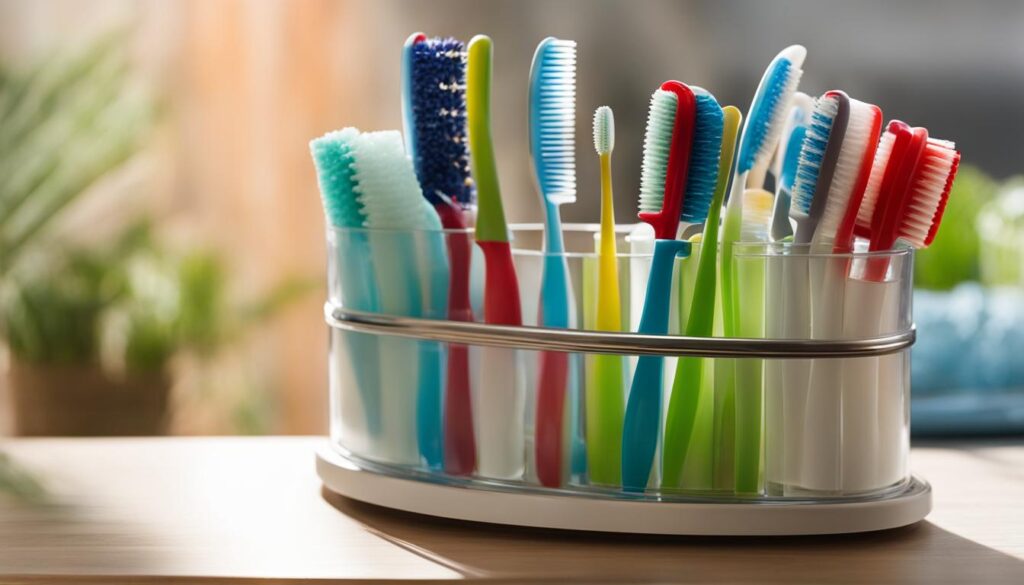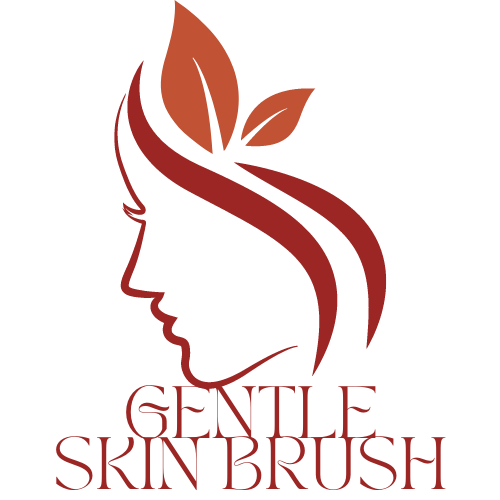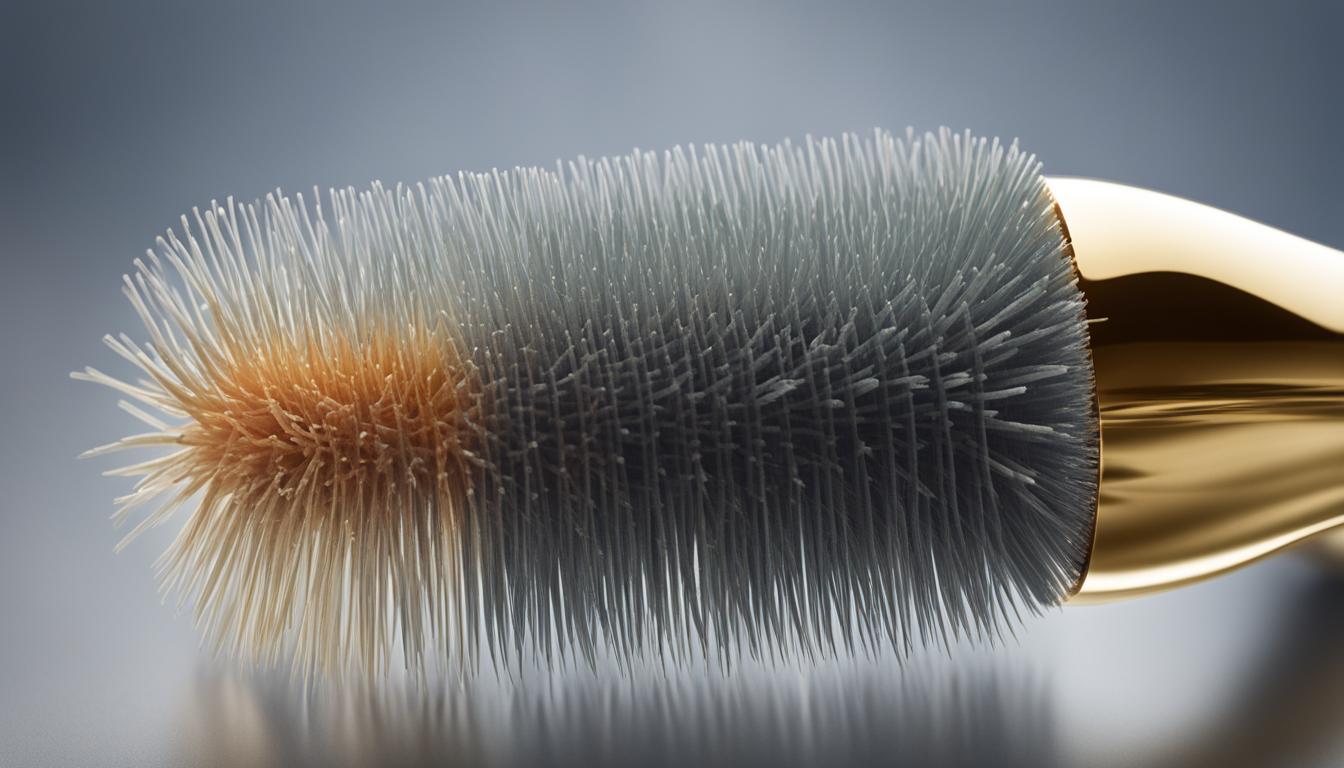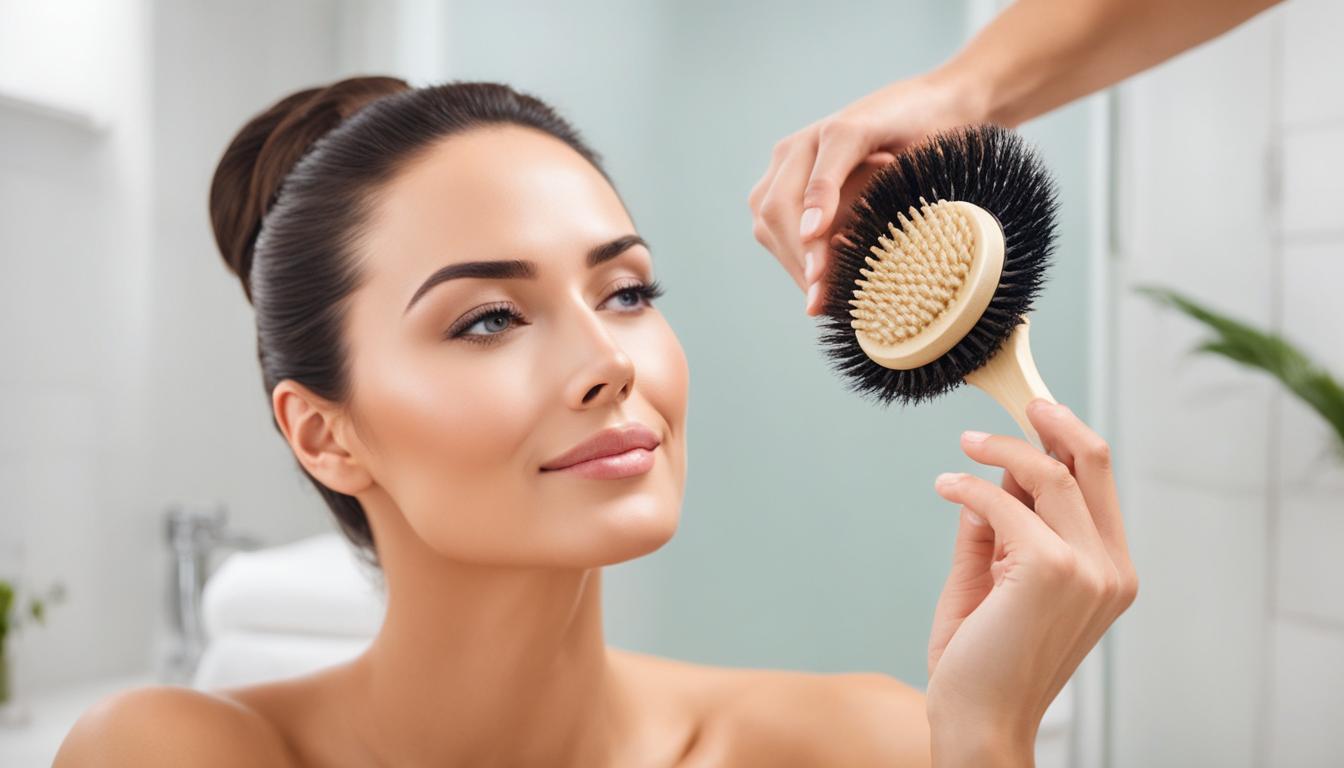Many people worry about the potential effects of poor oral hygiene on their overall health. One enduring myth asks: does toothbrush bristles cause appendicitis? The short answer is: not likely. Nonetheless, it’s essential to consider any potential dental hygiene and appendicitis association to maintain optimal health. In this guide, we’ll explore the relationship between oral hygiene and appendicitis, helping you make informed decisions about your dental care.
Contents
- 1 Understanding Appendicitis and its Common Causes
- 2 The Myth of Toothbrush Bristles Leading to Appendicitis
- 3 Proper Toothbrush Care and Oral Hygiene Practices
- 4 Assessing the Impact of Foreign Objects on Appendix Health
- 5 Conclusion
- 6 FAQ
- 6.1 Can toothbrush bristles cause appendicitis?
- 6.2 What is the connection between oral hygiene and appendicitis?
- 6.3 How can toothbrush care and oral hygiene practices help maintain a healthy appendix?
- 6.4 What is the link between toothbrush bristles and appendicitis risk?
- 6.5 What role do foreign objects play in causing appendicitis?
- 7 Source Links
Key Takeaways
- No concrete research links toothbrush contamination to oral infections or appendicitis
- Appendicitis usually results from an obstruction of the organ leading to inflammation
- Ingestion of indigestible objects can occasionally cause appendicitis, mainly in children
- Despite anecdotal reports, toothbrush bristles are not considered a significant cause of appendicitis
- Proper toothbrush care and maintenance are essential for overall oral hygiene, not specifically for preventing appendicitis
Understanding Appendicitis and its Common Causes
Appendicitis is a medical condition that commonly results from an obstruction of the organ, leading to inflammation. In some cases, the ingestion of indigestible objects, although rare in adults, happens more frequently in children and can occasionally lead to appendicitis. Most notably, items that enter the appendix and cannot re-enter the colon can initiate this inflammatory process.
Various foreign objects lodged in the appendix have been documented, such as pins, needles, coins, and seeds. Appendicitis resulting from these swallowed objects shows symptoms varying from hours to years after ingestion. To better grasp the potential impact of toothbrush bristles on appendix health, it is crucial to understand the common causes of appendicitis. Below is a table detailing the typical reasons behind this medical condition:
| Common Causes of Appendicitis | Percentage of Affected Cases |
|---|---|
| Obstruction (fecalith, calculi, lymphoid tissue, ingested foreign body) | 70% |
| Infection (e.g., viral, bacterial) | 20% |
| Tumors, malignancy | 5% |
| Ischemia, vascular-related | 5% |
Although the risk of toothbrush bristles contributing to appendix inflammation may seem worrying, it is essential to note that there is no solid evidence to link toothbrush bristles and appendicitis. In fact, the occurrence of toothbrush bristle-induced appendicitis is minimal and remains in question due to limited scientific backing. In most cases, appendicitis is a result of obstruction or infection rather than the presence of a foreign body.
“The correlation between toothbrush bristles and appendicitis is not well-established and should be taken with a grain of salt. Instead, individuals should focus on proper toothbrush care and oral hygiene practices to maintain overall health.” – Dr. Alice Green, DDS
Furthermore, it is important to remember that while proper toothbrush care is crucial for maintaining good oral health, it may not have a direct impact on appendix health. Therefore, it may not be appropriate to attribute concerns about can toothbrushes cause appendicitis to inadequate toothbrush care.
In conclusion, appendicitis usually results from obstruction or infection. While it’s necessary to take preventive measures and maintain proper oral hygiene, there is insufficient evidence to claim that toothbrush bristles have a direct impact on appendix health or that toothbrushes can cause appendicitis.
The Myth of Toothbrush Bristles Leading to Appendicitis
While the connection between foreign objects and appendicitis has been established, there is limited scientific evidence to suggest that the toothbrush bristle appendix connection plays a significant role in such cases. In fact, there have been very few instances in which toothbrush bristle-induced appendicitis is documented as a cause. This section explores the available case studies, the science behind appendicitis, and expert opinions on the link between toothbrush bristles and appendicitis risk.
Case Studies and Medical Reports Analysis
While there have been cases of foreign objects leading to acute appendicitis, such as a woman who ingested a condom fragment, instances where toothbrush bristles are the cause have been exceedingly rare. In fact, published case studies and medical reports highlighting a direct link between toothbrush bristle ingestion and appendicitis are virtually nonexistent.
Dispelling Myths: The Science Behind Appendicitis
Scientific evidence to support the theory of toothbrush bristles as a causative agent in appendicitis remains elusive. Appendicitis is often caused by the blockage of the appendiceal lumen due to foreign bodies or infection, but not necessarily by items like toothbrush bristles. On the rare occasion that bristles do end up in the appendix, they would have to cause a significant obstruction to result in appendicitis.
Expert Opinions on Oral Hygiene and Appendicitis Correlation
Despite speculative theories about potential injury or bacterial transfer from toothbrush bristles leading to appendicitis, there is no expert consensus supporting toothbrush bristles as a direct cause. In fact, proper toothbrush care is recommended as a means to promote good oral hygiene instead of preventing appendicitis.
Proper toothbrush care, which includes thorough rinsing with tap water after use, air-drying, and upright storage without cross-contamination in shared holders, is essential for maintaining oral health and preventing infection.
In conclusion, while it’s essential to maintain proper toothbrush care and oral hygiene practices, the notion of toothbrush bristles significantly contributing to the onset of appendicitis is largely without merit. The myth of the toothbrush bristle-induced appendicitis is likely fueled by isolated cases and general concerns about ingesting foreign objects, rather than any substantive evidence of such a link.
Proper Toothbrush Care and Oral Hygiene Practices

Good oral hygiene plays a vital role in maintaining your overall health and well-being. One of the key aspects of oral hygiene is proper toothbrush care. The American Dental Association (ADA) offers several guidelines to help you keep your toothbrush clean and effective in preventing dental health issues. Let’s explore the recommended oral hygiene practices and proper toothbrush care to ensure optimum dental health.
It’s essential to rinse your toothbrush with tap water after each brushing session to remove food particles, toothpaste residues, and bacteria from the bristles. Pay special attention to remove any debris trapped between the bristles to ensure a clean and ready-to-use toothbrush for the next session.
2. Store your toothbrush upright and let it air-dry
Keep your toothbrush in an upright position to facilitate the air-drying process, which helps to prevent the growth of mold and bacteria. Avoid covering your toothbrush or placing it in a closed container, as the lack of airflow creates a moist environment conducive to bacterial growth.
“Store your toothbrush upright and allow it to air-dry after each use to reduce the possibility of contamination.” – American Dental Association
3. Keep toothbrushes separate to avoid cross-contamination
When storing toothbrushes in shared holders, make sure the bristles do not touch each other to prevent cross-contamination and the spread of germs. An easy solution is to use separate toothbrush holders or wall-mounted toothbrush clips, which are specifically designed to keep toothbrushes apart.
4. Replace your toothbrush every three to four months
The ADA advises replacing your toothbrush quarterly or when the bristles become frayed and worn out. A toothbrush with frayed bristles is less effective at cleaning your teeth and removing plaque, which can lead to dental health issues if not addressed promptly.
- Rinse your toothbrush thoroughly after every use
- Store your toothbrush upright and let it air-dry
- Keep toothbrushes separate to avoid cross-contamination
- Replace your toothbrush every three to four months
While proper toothbrush care is essential, it is important to note that extensive disinfecting or sterilizing of toothbrushes has not been documented as necessary. Simple diligence in following the above outlined oral hygiene practices can ensure that your toothbrush remains an effective tool in maintaining your dental health.
Assessing the Impact of Foreign Objects on Appendix Health
Ingesting foreign objects is, without a doubt, a legitimate concern, particularly when it comes to the health of your appendix. Although rare, instances do exist where swallowed objects have obstructed the appendiceal lumen, leading to acute appendicitis. With that being said, let’s take a closer look at the true culprits behind appendicitis and the overall impact such items have on appendix health.
The True Culprits Behind Appendicitis
Several foreign objects have been documented as causing acute appendicitis, such as needles, bullets, seeds, and even toothbrush bristles. However, it is essential to note how infrequent these incidents are. Through assessing the impact of foreign objects on appendix health, one can determine that the risk of complication from ingested foreign objects is less than 1%. The table below highlights the incidence of various foreign objects leading to appendicitis.
| Foreign Object | Incidence of Appendicitis |
|---|---|
| Needles or pins | Rare |
| Bullets | Very rare |
| Seeds | Uncommon |
| Toothbrush bristles | Rare |
Given the rarity of these events, it is crucial to focus on a broader perspective surrounding the health and functionality of our appendix. While understanding the potential impact of foreign objects is essential, maintaining proper oral hygiene and care remains a priority for overall health and well-being.
“Given the rarity of these events, it is crucial to focus on a broader perspective surrounding the health and functionality of our appendix.”
In conclusion, education and awareness are key when discussing the topic of the true culprits behind appendicitis and the effect of foreign objects on appendix health. By understanding the rarity of such incidents and the importance of proper oral hygiene practices, you can better maintain your overall health and take necessary precautions when it comes to ingesting foreign objects.
Conclusion
The belief that toothbrush bristles can lead to appendicitis is a misconception based on the idea of ingesting foreign objects and their potential health consequences. In reality, there is no solid evidence that supports the notion that toothbrush bristle ingestion increases the risk of appendicitis. Instead, it’s essential to focus on maintaining proper oral hygiene and care to ensure overall health and well-being.
Instances of foreign bodies causing appendicitis, such as toothbrush bristles, needles, seeds, and others, are extraordinarily rare and account for less than 1% of cases. The risk factors related to toothbrushing and appendicitis are minimal, and individuals should prioritize their dental health practices without fear of appendix inflammation.
In conclusion, it’s critical to dispel the myth of toothbrush bristle inflammation of the appendix and concentrate on proper oral care habits. By following recommended guidelines for toothbrush care and dental hygiene, individuals can effectively promote overall health and prevent more significant health issues.
FAQ
Can toothbrush bristles cause appendicitis?
There is no scientific evidence to support the claim that toothbrush bristles can directly cause appendicitis. Appendicitis often results from blockage or infection, not specifically from objects like toothbrush bristles.
What is the connection between oral hygiene and appendicitis?
There is no established correlation between oral hygiene and appendicitis. Oral hygiene practices like toothbrush care are important for maintaining overall oral health, not for preventing appendicitis.
How can toothbrush care and oral hygiene practices help maintain a healthy appendix?
Proper toothbrush care and oral hygiene practices contribute to overall health and well-being, but they are not specifically targeted at maintaining appendix health. They help prevent infections and maintain overall cleanliness.
What is the link between toothbrush bristles and appendicitis risk?
No concrete evidence links toothbrush bristles to appendicitis risk. While foreign objects lodged in the appendix can cause appendicitis, toothbrush bristle ingestion is an extremely rare occurrence with no significant evidence to suggest it as a cause.
What role do foreign objects play in causing appendicitis?
Foreign objects can cause acute appendicitis if they block the appendiceal lumen, but this is rare, and the risk of complication from ingested foreign objects is under 1%. Common foreign objects reported include pins, needles, coins, seeds, and even toothbrush bristles, but the majority of incidents are not related to toothbrush bristle ingestion.





Leave a Reply